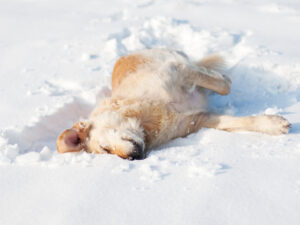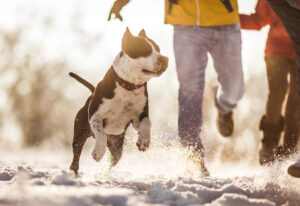Cold winter weather is upon us. As a result, it is important to take some extra precautions to protect pets. Exposure to cold temperatures can cause dogs and cats to suffer from chapped paws and itchy, dry skin. In addition, chemicals from products used to melt ice can be hazardous if ingested by pets. Taking some common sense steps to protect your pet from the possible dangers of cold weather is necessary to keep him healthy and safe.
Dry, itchy skin is common for pets during the winter. This occurs when your pet comes inside after spending time outdoors. The dry heat can cause her skin to become flaky. Therefore, it is important to thoroughly dry your pet immediately upon entering your home. Be sure to dry her paws thoroughly.

After going on a walk with your pet, wash her feet and stomach to remove any ice or chemicals. Again, be careful to dry these areas completely. Pay attention to her paw pads. Check each one thoroughly for cracks or redness.
During the winter months, consider your pet’s grooming details. Shaving a dog’s coat during cold weather should be avoided. A longer coat will provide your pet with the necessary extra warmth he needs during the winter months. Long-haired dogs should be trimmed to avoid the accumulation of ice balls and de-icing chemicals on their stomachs. Short-haired dogs should wear a sweater or coat when going outside for protection against the cold. Giving too many baths during the winter can remove important oils from the skin which offer protection against dry, itchy, flaky skin. Consider using a moisturizing shampoo or rinse when bathing your dog.
Pet’s paws require extra attention during winter. Petroleum jelly is good for massaging into your pet’s paw pads before they go outside. This will help protect their paws from salt and chemicals. Booties are also good protection for your pet’s paws. If you must use a de-icer, there are several pet friendly options available.
During cold weather, your pet will burn more calories. Therefore, increasing the amount of food he consumes to provide the extra energy he requires during the winter is appropriate. Also, be sure your pet has lots of water available to keep him hydrated.
Be sure your pet has a warm bed with a towel or blanket. Take extra care not to place your pet’s bed near a drafty door or register. When it’s too cold outside for humans to remain for long stretches of time, it is too cold for pets. They can freeze and become disoriented when left outdoors in cold weather. Bring your pets inside during the winter months to keep them safe and protected. Remember to never leave your pet in a car during cold weather.

Antifreeze poisoning can be fatal for pets. To protect your pet and prevent possible poisoning, there are several precautions you should take. Keep antifreeze in a sealed container in a safe area away from pets. Safely dispose of antifreeze by taking it to a service station for disposal. Never pour it on the ground. Immediately clean any leaks in your driveway or garage thoroughly. Using alternative products less toxic to pets is wise.

Winter is a beautiful season that brings with it colder temperatures which can create potential hazards for pets. By following these common sense guidelines to protect your pet, both of you can safely enjoy the winter wonderland the next few months may bring.
